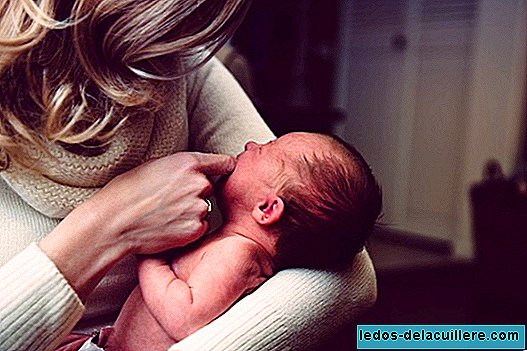The normal weight of a full-term newborn can range from 2.5 to 4 kilos. In its first year, the baby will experience the highest growth rate of its entire life, especially at the stage between four and six months.
And it will seem incredible that the little newborn ball that you hold in your arms today will triple its weight when it blows its first candle. Undoubtedly a wonderful and amazing evolution that we share today!
Newborn (from 0-7 days)
A newborn baby usually loses between five and 10 percent of his weight during the three or four days following his birth. This physiological weight loss is absolutely normal, and is due to the expulsion of urine and meconium accumulated during pregnancy, and that at first they eat very little.
Remember that the stomach of the newborn is like that of a marble, so if you have opted for breastfeeding, the first few days you will have enough with colostrum. When the rise of milk occurs, your body will adjust the production to the demand of your baby, hence it is so important always offer breastfeeding on demand.

Typically, after the fourth day, the baby stops losing weight and begins to gain weight, coming to recover his birth weight around the first week of life (or even sometimes somewhat later).
During these first days it is important to check that the baby is recovering the lost weight, because otherwise it would be necessary to assess what is happening (reflux, health problems ...), as well as analyze possible problems with breastfeeding (poor grip, sublingual frenulum , retrognathia, problems with production ...)
First month
Until the first month and a half of life, or approximately the first six weeks, the baby will gain about 20 grams daily, which is equivalent to an average of 140 grams per week.
By the tenth day of birth, the mother's milk is transformed into transitional milk, which contains less protein than colostrum and will vary day by day until it reaches the composition of mature milk.
The volume of milk increases with each teat, so the baby's stomach will adapt to this new circumstance. Mother and son sympathize: She will produce more milk as the baby increases the volume of her stomach to drink it. Or maybe it is the other way around, the size of the baby's stomach increases and the mother's body, who knows it, produces more milk to give her what she needs.
Second and third month
If until six weeks of life our baby has been gaining weight as established and the mother feels that her breastfeeding is going well (no pain, cracks, bad grip ...), it could be considered that breastfeeding has already been established.
Pediatric checkups will continue to monitor the baby's weight, and it is normal for the weekly weight gain is between 100 and 200 grams. However, if your child pees frequently, their poops are normal and their mood and general is good, you should not worry about the weight because each child follows its own growth curve.
From the fourth to the sixth month
At this stage of his life the baby will experience a weekly gain of between 80 and 150 grams, which translates into an average of between 500 and 650 grams per month. At this rate, the normal thing is that by the age of six months you have doubled your birth weight.
Remember, in addition, that your diet should continue to be exclusive breastfeeding, whether maternal, artificial or mixed.

And although luckily there are more and more professionals aware of breastfeeding and duly informed, it could also happen that we find the opposite case, and if our baby does not follow the general canons of weight they recommend us to advance the complementary feeding.
However, as our partner Armando commented in this fantastic article, this measure would be meaningless, because Milk (either maternal or artificial) contains more calories than fruit or vegetables, and is nutritionally richer than cereals.
Logically we talk about healthy babies, but they follow their own rhythm. If, on the other hand, the height curve is rising but the weight curve is stagnating, we should see what is happening and why the baby is not gaining enough.
From six to nine months
After six months, weight gain will no longer be as pronounced as before, and it is normal for the baby to gain between 40 and 85 grams per week, which translates into a monthly average of between 300 and 450 grams.

After six months the baby should start with complementary feeding, but remember that the basis of your diet should continue to be milk, and if breastfeeding continues, breastfeeding should be on demand.
From nine to twelve months
The last trimester before reaching your first year is the time when the baby will take less weight, with an average of between 200 and 300 grams per month. The normal thing is that By 12 months, the baby has tripled its birth weight.
In any case, it is important to remember that these data are approximate and based on percentiles and statistics, and that the weight gain of breastfed children is different from those fed with artificial milk.As for the weight, pediatricians recommend analyzing their increase over a period, and do not value it as something isolated at a specific time because, as we have commented throughout the article, each child has their own growth rate and the important thing is not so much that they gain weight but grow healthy and happy.
Via Spanish Association of Pediatrics












